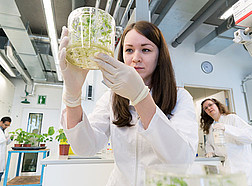Training to become a biological laboratory assistant follows the framework of Germany's dual system of vocational training, meaning that the classroom-based part takes place at Carl Engler School in Karlsruhe.
In the remaining time, practical and theoretical skills are learned at the workplace.
Apprentices progress through the following departments and institutions:
- Analytical Chemistry Unit
- Livestock Infectiology and Environmental Hygiene
- Dairy Sciences
- Plant Evolutionary Biology
- Physiology of Yield Stability
- Animal Nutrition
- Seed Science and Seed Technology
- Landscape and Plant Ecology
- University Experimental Animal Facility
Apprentices progress through these departments/institutions in intervals of 4 to 6 months.
During their training, trainees attend in-house seminars to supplement their vocational school education and to enhance their hands-on learning.
The final examination consists of two parts administered at two different times.
Part 1 tis taken after about 1.5 years, and part 2 at the end of the training program.
Both parts consist of a written and a practical component.
When calculating the total score, the two parts are weighted as follows: part 1: 35%, part 2: 65%.
Examinations are administered by the Chamber of Industry and Commerce.
Biological laboratory technicians are elegible to apply to open positions at the University of Hohenheim. The subsequent hiring of former trainees as permanent employees, as well as future career development opportunities, depend both on institutional needs and on candidates' personal and professional performance.
Trainees are currently paid:
- € 1,086.82 in the first year of training
- € 1,140.96 in the second year of training
- € 1,190.61 in the third year of training
On 1 November 2024, the amounts will increase by a fixed sum of EUR 100, and on 1 February 2025 by a further fixed sum of EUR 50.
Documents
- Application letter
- Résumé
- Copies of the last two school reports (mid-year and full-year reports),
- evidence of work experience or internships, if applicable
Only electronic applications through the application portal will be accepted. If you have any questions, please contact Dr. Annette Falter (email).
Interview
Selected applicants will be invited for a personal interview.
After completion of the selection process, all application documents are destroyed in accordance with data protection regulations.

